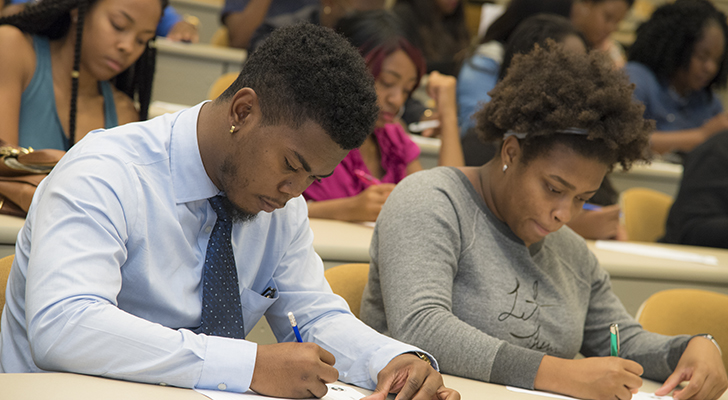TAMPA, Fla. (March 1, 2017) -- The University of South Florida (USF) has been recognized as a top-performing university — number one in the state of Florida and sixth in the nation — for eliminating the completion gap between black and white students, according to a report released today by The Education Trust, “A Look at Black Student Success: Identifying Top – and Bottom – Performing Institutions.”
The report examines the graduation rates and completion gap data between black and white full-time, bachelor’s degree-seeking students at 676 public and private non-profit colleges and universities. Noting that while black student enrollment at four-year colleges and universities is up 37 percent over the last 10 years (compared to 28 percent growth for all undergraduates), graduation rates for black students are 22 percent points below the graduation rates of white students.
In comparison, the USF graduation rate for black students was 63.7 percent (a three year weighted average of 2012, 2013, and 2014), exceeding the national average of 40.9 percent by 23 percentage points. USF’s data from the academic years beyond the scope of the report indicate this rate has increased to 69 percent, exceeding that of white students.

The latest Education Trust Report recognizes USF as a top-performing institution for Black student success.
“At USF a fundamental principle of our student success initiative is the belief that all students, regardless of race, ethnicity, and socioeconomic status, can and will succeed if given the opportunity to do so,” said Vice President for Student Success and Student Affairs Paul Dosal.
Over the last 10 years, USF has transformed its approach to student success and the student experience by developing a focused and deliberate change in institutional culture, embedding the belief that every student will succeed and that student success is everyone’s responsibility. This culture change, coupled with supporting programs and first-year student data analysis, has helped to move the USF six-year graduation rate for all students, from 47 percent to 67 percent. As a result, USF has been lauded by a number of national organizations for its student success efforts, including the Center for American Progress for “promoting access and success for all” students, Eduventures recognition with the 2016 Innovation Award, and selection by the National Center for Higher Education Management Systems as a national mentor university for black and Latino student success.

The USF graduation rate for black students exceeds the national average of 40.9 percent by 23 percentage points.
“USF is proud to be recognized for our best practices in student success,” said Provost and Executive Vice President Ralph Wilcox. “Access and success are core tenets of our mission and vision. With 40 percent of our undergraduates being Pell recipients and 30 percent the first in their family to graduate from college, it is critically important for our students and our community that we remain steadfast in our pursuit of even greater gains through sustained dedication to academic success for all students.”
In 2016, USF began using a real-time predictive analytics platform designed to identify at-risk students and provide more timely support, and recently implemented a case management approach with a care team comprised of representatives from throughout the university each trained to support student persistence.
The Education Trust is a national non-profit advocacy organization, established in the early 1990s, to promote high academic achievement “for all students at all levels, particularly for students of color and low-income students.” Additional information about the Education Trust’s report, published March 1, can be found online: https://edtrust.org/resource/blackstudentsuccess/.

USF leaders have made eliminating the completion gaps between black and white students a top priority. The university's deliberate approach to embedding student success into the institutional culture has helped lead the way in equitably graduating full-time, bachelor's degree-seeking students.